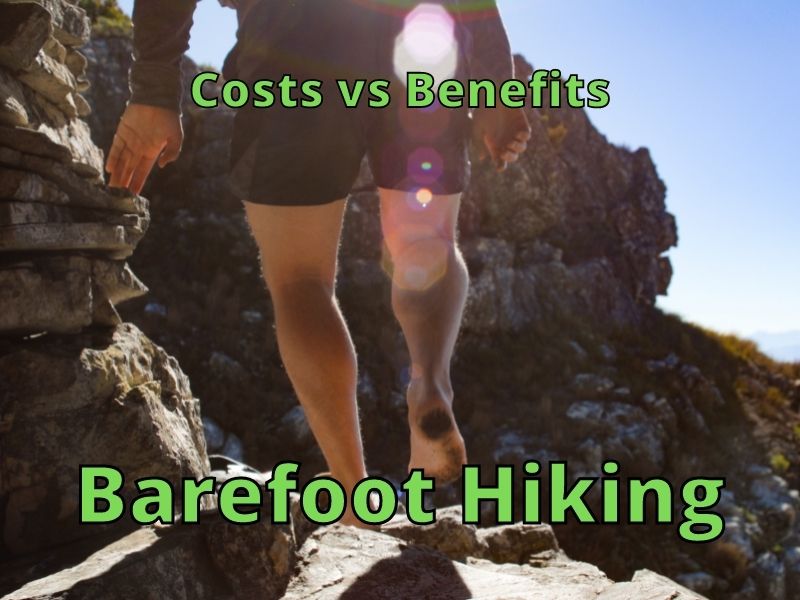I remember when I was a child I used to play outside our house barefoot. It was kind of a pleasure for me as a child to feel the grass and the ground. So I wondered, how does barefoot hiking feel like?
Barefoot hiking has more benefits than costs if you take time to ease into it. Unwanted accidents or soreness can come to those who hike barefoot without being ready. Barefoot hiking is very beneficial to your feet especially in strengthening your muscles and ligaments.
Barefoot hiking might be a new concept for many but if you weigh the pros, they will outweigh the cons almost every time. It’s a great way for you to get closer to nature and stay healthy at the same time.
Why Do People Barefoot Hike?
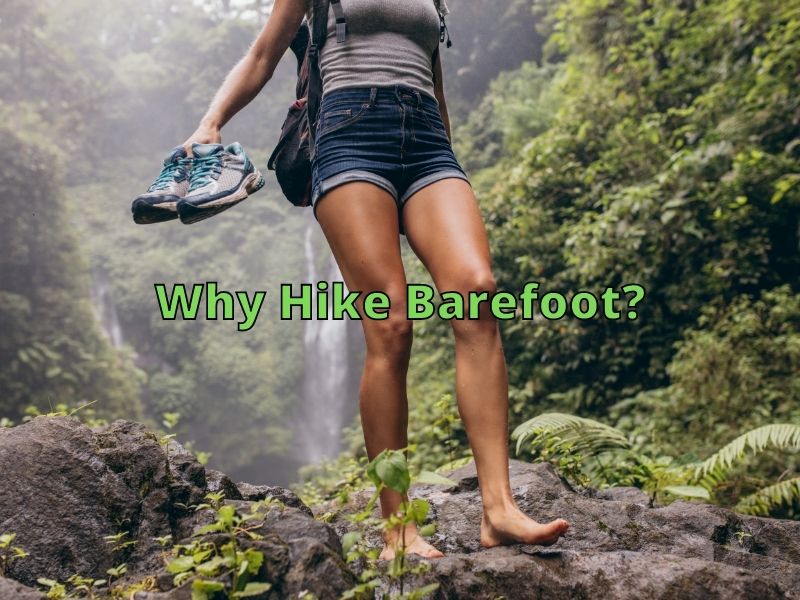
In 2001, two siblings hiked the Appalachian Trail barefoot. But surprisingly, barefoot hikers aren’t just thrill-seekers. When you walk barefoot, your feet are in constant contact with the ground.
This foot perception gives you a whole new experience when hiking. It’s a good idea to start with barefoot walking on smooth surfaces for a while to get calluses on your feet. As calluses harden and feet get stronger you can start with a short hike.
Barefoot hiking may sound unusual for many people who are used to wearing boots when hiking. Those who can hike barefoot will have all the unique good and bad experiences even more pronounced.
“And forget not that the Earth delights to feel your bare feet and the winds long to play with your hair.”
You can join a barefoot hiker chapter in many places around America. Some places you might find them are Connecticut, California, Massachusetts, Minnesota, and Ohio. So, why are so many people in different places hiking barefoot? It makes them feel closer to nature when they can walk without shoes and feel all the sensations of the ground beneath them.
It’s an alternative way to view and experience the world that most people may have never felt before. People who have never done barefoot hiking before may still be in doubt about it because of the big probability of unwanted injuries.
But with the right training and a plan, you’ll find out that barefoot hiking can be fun and convenient.
On the whole, barefoot hiking isn’t actually different from other types of hiking. It requires thorough preparation and lots of practice, but at the same time, it offers satisfying experiences and loads of health and therapeutic benefits.
Barefoot hiking may not be the right choice for fainthearted travelers, but if you are among those who seek a true connection with Nature, you should definitely give barefoot hiking a try.
—Luna Anderson
The other thing that makes people switch their usual hiking habit to barefoot hiking is that it can save you a lot of money buying different pairs of hiking boots. For minimalist people or just someone trying to cut down their expenses barefoot hiking is the best way to go. (see article)
Benefits Of Barefoot Hiking
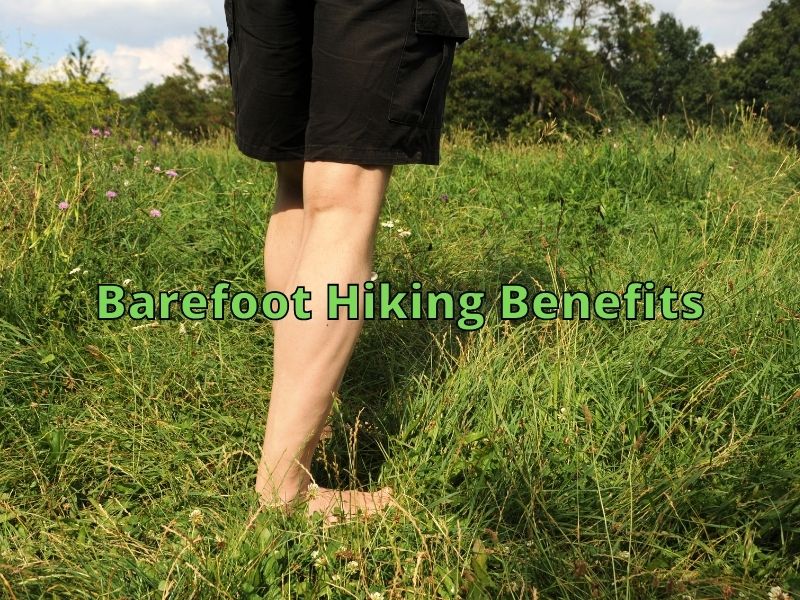
There are many health benefits of barefoot hiking that include the opportunity to strengthen your muscles, and it can save you a lot of time especially when you are trying to hike in slippery and muddy trails. It also helps reduce soil erosion from heavy boot trail tracks.
Barefoot Hiking Reduces Soil Erosion
With so many people hiking popular trails and trails getting overrun at times, the biggest benefit may be that barefoot hiking is environmentally friendly. When you hike with your bare feet, you will likely not cause any soil erosion along the trail that heavy hiking boots do. (see article for more info on barefoot running)
The Opportunity To Strengthen Your Muscles
Imagine getting a nice and relaxing foot massage for free. Yes, when you walk barefoot especially on stones it can give you that therapeutic feeling like you are in a spa having a nice foot massage. Not wearing any shoes or boots, your feet will most likely get to do all the work.
Plus, hiking barefooted can be more beneficial for your joints and ligaments. You’ll be shocked at how firm your feet are and what they are capable of overcoming as long as you give them a chance.
When we walk with our feet in socks and shoes for most of our waking adult life we can’t experience the natural biomechanical movement or perception that comes when hiking barefoot.
Yet, with practice, we embark on this new chapter in our lives of transitioning from heavy boots and shoes to no shoes at all. We reclaim what we lost as a child when we walked without shoes.
Gives You An Edge When You Hike Along Muddy Or Slippery Trail
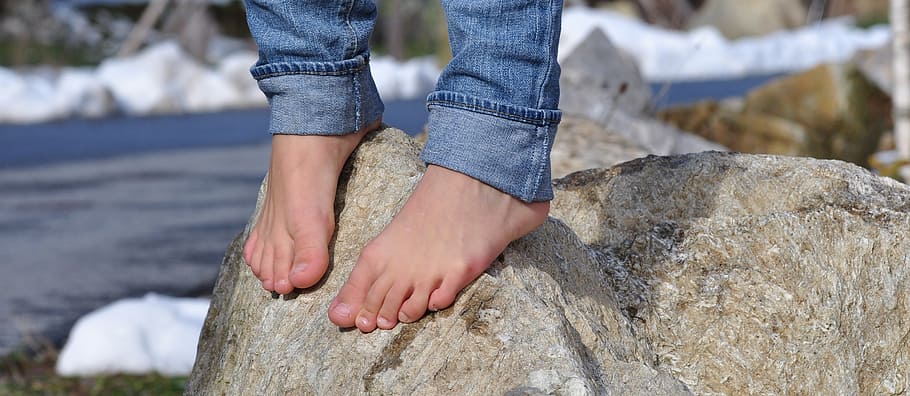
Your feet are very similar to your hands. Why? Because your feet have toes that can grip and hold firmly once they are strong enough. As you practice enough and have strong feet, going for a barefoot hike will give you an advantage over shoes in many slippery and muddy situations.
Saves You A Lot Of Money
When you walk barefoot you don’t need to invest in hiking shoes. You can spend time developing your feet and saving money over all the times you go barefoot hiking. So if you are considering buying a new pair of hiking boots, maybe transitioning to barefoot hiking will be more rewarding physically and financially.
What Do You Need To Do If You Will Try Barefoot Hiking For The First Time?
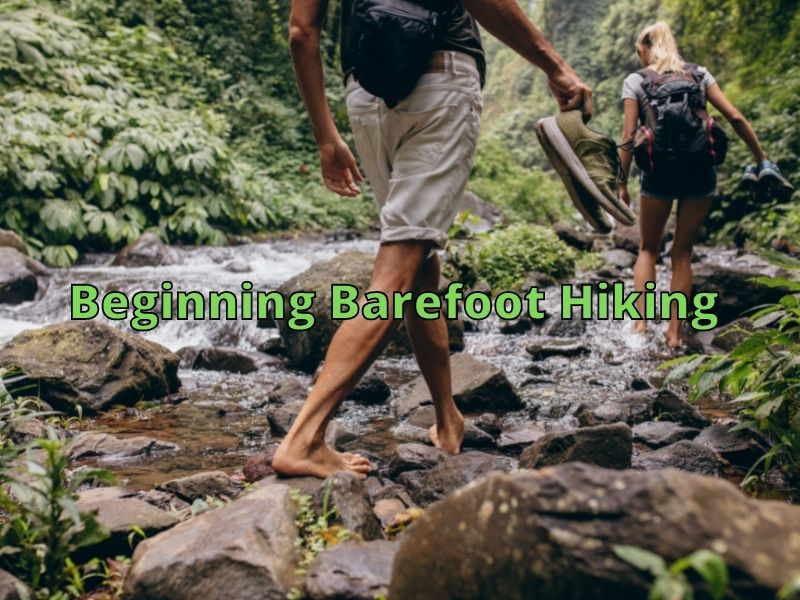
Those who have used shoes all their life may be in a rude awaking, when transitioning to barefoot hiking. Preparation is key before an actual hike takes place so you don’t end up with pain and injuries.
We can avoid pain and suffering by taking it slow at first. Here are 5 things that you might want to consider before doing your first barefoot hike.
- Start at the beach, lake, or steam. Get your feet used to walking over objects and the ground in a safe environment. As you continue, your feet will start to adapt. It may seem very hard at first on rough terrain, but soon it will become considerably easier.
- The reason is that muscles, nerves, and the feet, in general, need time to adapt. A month of barefoot practice for 5-10 minutes can make a big difference.
- Walking on highly textured ground takes time to get used to, and starting slow can help a lot. Some people may like wearing extremely thin-soled shoes even before going barefoot.
- Develop habits of awareness. When you meditate, you are focusing your awareness. Like meditation, barefoot walking should be taken one breath at a time, slowly walking, and being aware of where we step.
- If you’re about to step on something sharp, you can notice this and shift your weight so your foot doesn’t put pressure on the sharp area. With more practice, you and your feet will not just walk but start to grab the ground, similar to a hand, and sense the best way to place your foot.
- Your agility and adaptability of your feet will increase.
- The surfaces under your feet will remind you that touch can come from not only your finger but your toes.
- Seek solid surfaces. You might want to start walking for 5 minutes on the sidewalk or the beach a couple of times a week.
- Carry a backpack. You should always have a pack for shoes when your feet start to get sore or get injured. When your soles feel tender, lace-up.
What To Expect During Your First Barefoot Hike?
Everything we do for the first time may seem so hard for the first few moments but the process of embracing all the possibilities and perks will eventually give us this feeling of fulfillment and joy in doing the things that we thought we couldn’t.
Think about barefoot hiking in this type of situation. Walking around with our feet literally on the ground may seem exhausting for the first few moments but as time goes by you can feel how therapeutic and beneficial it is to your feet.
Expect the feeling of having free massages from nature as you pass by the rocks. I think you will also feel surprised how your feet can be so strong when trying to cling on the ground when the trail is starting to get slippery or muddy.
Expect also other people’s initial reaction to the idea of it and how they can judge you or call you such names for just taking an interest in different things that they don’t usually understand. But remember that you are your own navigator and you can lead yourself wherever you want to go.
Barefoot Hiking Tips
Take good care of your feet
This one sounds obvious, but not everyone knows how to properly take care of their feet. Make sure to wash your feet soon after you’ve gone barefoot walking, especially if you have scratches or cuts.
Bring a first aid kit in your pack. I use antibiotic ointment and bandages when I get a cut during a hike. You might expose your wound to bacteria for too long if you don’t take care of it and it could be painful for a long time.
Pay attention to the way you walk
At first, your feet won’t be so nimble. You may not notice that you are not lifting your toes or sliding your feet. Take it slow and enjoy a slow stroll with some deep breaths. You’ll soon be more aware of how your feet are contacting the ground.
It’s also important to watch your step because you never know what you’re going to encounter on your walk or hike. Some people like to land on the ball of their feet, like a runner. This can help your foot absorb impacts better and have less impact on your joints.
Just be aware that you may need to stretch your calves after a walk or hike, so you don’t pull a muscle later on.
Barefoot Hiking In Winter
I know the thought of standing outside barefoot in cold weather doesn’t sound appealing. Yet, barefoot hikers can hike in shallow snow if their feet are well prepared beforehand.
The trick is to hike in colder weather until your feet become more accustomed to it. As your feet adapt, they will slowly feel more natural in cold situations, even snow.
It may take months before your feet become ready but it is possible. Remember to wear warm clothing on the rest of your body. (See my article about hiking pants)
Pros and Cons of Barefoot Hiking
Pros
- Can help you strengthen your muscles and ligaments.
- Prevents soil erosion caused by heavy hiking boots.
- Gives you a sense of belongingness with nature.
- Can help you avoid slipping on slippery tracks.
- Very therapeutic to stressed feet.
- Saves you a lot of money from expensive hiking shoes.
Cons
- Not for germophobes.
- Possible direct contact with bacteria.
- Can cause unwanted injuries such as wounds, cuts, or scratches to your feet.
- Soreness of the feet after a long hike.
- Situations during unfavorable weather.
See my article about barefoot and minimalist shoes.
Conclusion
Do you think barefoot hiking is possible for you? Once you try it you may start to enjoy all the experiences you have. The benefits of barefoot hiking are really worth it for some people who like to try new things.
It is a great way to go on adventures and just be one with nature and still enjoying your hike. One thing I like about barefoot hiking is that it constantly gives you a sense of purpose in respecting Mother Earth’s beauty.
Our ancestors have been walking barefoot in most cultures in the past. Walking without shoes is natural, but takes time to get used to. Barefoot hiking might be something you start to love.
Thanks for visiting Helpshoe.com
References
https://www.quora.com/What-are-the-pros-and-cons-of-barefoot-hiking

